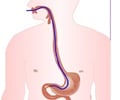Causes of Crohns disease
What causes Crohn’s disease?
- Genetic predisposition?
- Infection by mycobacteria?
- Overactive immune response to an initial bacterial attack?
- Environmental factors/diet?
The answers are elusive.
A gene (NOD2) has been isolated which could determine the way a person responds to the disease.
Certain mycobacterium is believed to be behind the attacks of the disease, but it has not been proved conclusively.
Many believe that it is an exaggerated response by the immune system of the body. Excess production of Tumor necrosis factor –alpha is said to lead to the ulcer formation.
Pathogenesis of the disease: Initially it starts off as small shallow ulcers like the aphthous ulcers one would find in one’s mouth. Later it develops into deeper ulcers that may extend up to the bowel wall and at times even erode the bowel and extend beyond into the adjacent organs.
The areas of the intestine between the ulcers are often normal. The repeated attacks of inflammation cause narrowing of the intestine, and loss of the normal architecture of the bowel, leading to a stiff, rigid, pipe-like intestine, often referred to as ‘hose-pipe intestine’. The narrowing sometimes leads to obstruction and can precipitate an acute abdomen. When the intestines perforate it leads to a spill of the inflammatory substances, bacteria and digested material from the food ingested into the abdominal cavity.
The clinical and pathological features quite often mimic intestinal tuberculosis and close scrutiny will differentiate the two diseases













